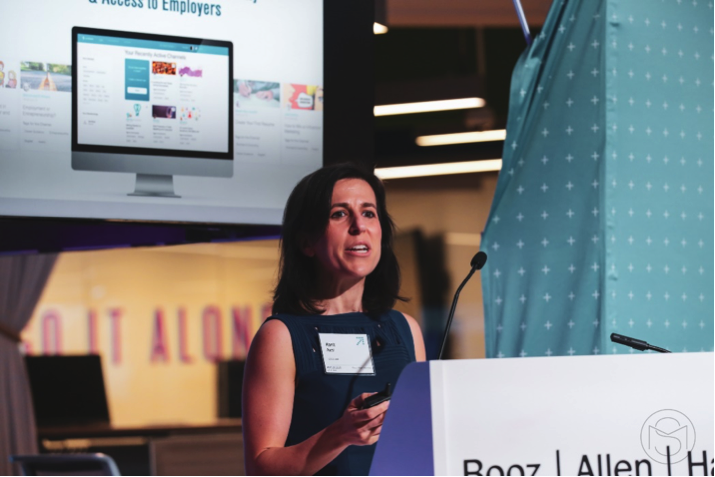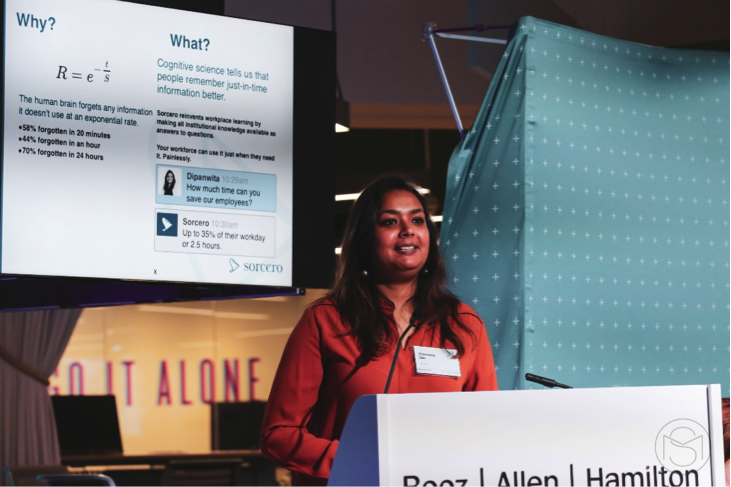DC Is a Growth Center for Women Entrepreneurs: Here are Four Startups to Watch
With organizations like The Vinetta Project and DC Fem Tech, Washington, DC has become a top city for female entrepreneurs to launch their startups and raise capital. Outside the nation’s capital, these founders might not find the same opportunities; in 2017, women received only 2 percent of all venture funding.
This summer, The Vinetta Project—a national organization dedicated to helping women-led businesses break into the funding ecosystem—hosted a Venture Challenge Showcase at its Innovation Partner Booz Allen Hamilton’s DC Innovation Center. Four high-potential founders were chosen from 90 applicants; they pitched their businesses to an esteemed panel of experts and hundreds of community supporters for a chance to generate customer awareness, and get access to investors and capital.
"The presenters hit it out of the park, pitching impressive growing businesses in Agtech, artificial intelligence, transportation and Edtech," said event emcee Amelia Friedman, co-founder and COO of Hatch Apps, which allows users to build apps without writing code. "I can only imagine how tough it was for our fabulous panelists Meghan Buck [CEO at VEDA Data], Roselle Safran [Entrepreneur in Residence at Lytical Ventures], Steve Taylor [General Manager at Lyft], and Peggy Styer [Partner at Razor's Edge Ventures] to select finalists for the $20,000 prize."
Read about the four startups from the June Showcase:
- Go Together | Making school transportation easier
According to Kimberly Moore, CEO and co-founder of Go Together, schools and parents face a growing infrastructure challenge. Budgets for buses are increasing, and at the same time more parents are driving their kids to school—putting a strain on traffic in and out of campuses. Moore developed CarpooltoSchool, to solve this daily issue through technology. It’s a platform sold to schools to safely collaborate with parents on student carpooling. Every user is vetted and has a profile that’s matched to riders based on intelligent mapping that factors in location and schedule. Moore emphasized that they’re facilitating a “trust exchange” so parents can feel at ease and the power of community can make everyone’s life easier.
- HiveLend | Connecting farmers and bees
Society depend on bees for more than one might expect—specifically, 35 percent of our food supply according to Dawn Musil, founder of HiveLend. But every year it’s becoming more difficult for farmers to access bees for pollination, which has a negative impact on the crops they can yield. HiveLend aspires to open new economic pathways by connecting farmers with beekeeping hobbyists—an untapped 65% of the hive market. Musil’s startup offers comprehensive services beyond making a connection through their digital platform: insurance, supply chain, and transportation for the bees. They just released a beta model in January and are working with 26 farmers today and counting.
- Sorcero | Helping employees work smarter
The biggest problem with workplace training? Employees forget what they learned in training by the time they actually need it, says Dipanwita Das, Founder and CEO of Sorcero. While “we can’t do anything about the human brain,” her company believes there’s a better way to make knowledge more readily available at the right times. Sorcero has developed a new model for knowledge management using artificial intelligence (AI) to pull all training content (a huge investment for companies) into a stack that allows employees to ask questions and receive answers along with recommended materials and trainings. The platform not only helps employees access information to do their work better, but it can also surface key gaps in training if the bot can’t answer the question, as well as determine what training formats users prefer depending on the context.
- Localized | Creating job opportunities in emerging markets
In emerging economies, students can be the top of their class but they may not have access to career services, alumni networks, and relationships to local employers. Ronit Avni, Founder and CEO of Localized, says her company is solving this problem which she calls a “broken pipeline.” Localized provides students in emerging markets with a virtual platform that offers career counseling services, networks, and roles models—along with access to global employers. It uses a B2B model where schools subscribe for an amount less than hiring a career counselor in the local market. Her company is currently operating in Jordan and plans to expand into India next year. Top companies like Expedia and Dell are signing on to save time and money when it comes to recruitment in emerging markets, a $17 billion industry.
The guest panelists followed up the pitches with questions related to the business strategy, mission, and revenue model, and offered guidance to the founders on a variety of topics: being a female founder in male-dominated spaces like AI; how to think about acquisitions; understanding your buyer; adding even more punch to your pitch. Meghan Buck gave one founder some advice based on personal experience: “When you have a male co-founder, put your own bio first.”
What’s next for the startup community
“This is one of the most powerful rooms that I’ve been in,” said Duane Rollins, National Director of Products and Impact at Seed Spot—an accelerator for social entrepreneurs. Rollins announced a partnership between Seed Spot and The Vinetta Project to support impact-driven women entrepreneurs at one of their 2-day Launch Camps later this year, also to be hosted at Booz Allen. Participants there will be able to go from having an idea, to articulating the business opportunity and benefiting from an early-stage community to help activate it.
After the event, the two semi-finalists selected to move on to the final Venture Challenge Showcase in September were Localized and Sorcero. Booz Allen will be hosting the final showcase along with two additional workshops with the Small Business Association (SBA) to provide insights for female founders on how to gain access to the federal government, the world’s largest customer.
Dee Dee Helfenstein, Senior Vice President at Booz Allen, serves on the Vinetta DC Advisory Council and explained why this ongoing alliance is so important to her company. “Getting women entrepreneurs access to mentors, partners, capital, and council—it’s something we’re all passionate about and it’s why we love this partnership with The Vinetta Project.”
Read more about how Booz Allen and the Vinetta Project are empowering women entrepreneurs, here.



